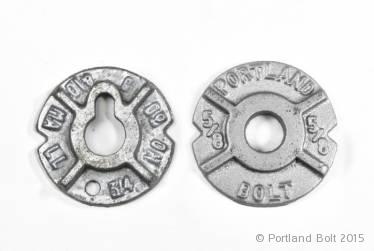What are the purposes for the different components in malleable iron washers (MIW)
For many years a malleable iron washer has been a common component in heavy timber and marine construction. With a large bearing surface and thick cast design they help prevent the bolt head or nut from pulling through wood connections.
There are two common types of MIW. One style of malleable washer is produced in the United States, while the other is made overseas. The import option is readily available in the marketplace in sizes for bolts from 3/8″ to 1″ in diameter. It has one nail hole and two notches on the outer edge. The domestic washer is similar with two vertical slots on the outside edge, but is missing a nail hole. Both have similar inside and outside dimensions.

According to the original patent from 1907 the outer notches were meant to lock the washer from turning against the wood. A chisel is used to bend the metal edge into the wood. To our knowledge, this installation process is rarely used.
The keyhole is historically used to drive a nail or wedge in against the nut, to lock it into place and keep it from turning. Here is an original patent from 1904 for a similar washer that shows a keyhole and nail being used in this way.
Over time, the features for both washers were combined into one washer with the features of both.


Hello, I would like to purchase a few of the Domestic washers (with Portland on them). I split my time between here and rural France where I am renovating a little French house. The ends of the exposed ceiling joists have rotted so I am doing a join with new timber at the ends. Thought it would be fun to use Portland washers for the bolts. Thank you!
Judy
@Judy- we normally do not sell in a retail type setting, but in this case we’d love to help you rep Portland Bolt in your French country house.
What is the smallest diameter bridge washers you sell ?
@Bryan – We have some 3/8″ round malleable washers in stock, that is the smallest size available.
How can I purchase 6 domestic malleable iron washers 5/8 ?
@Tom- One of our salespeople will contact you shortly.
I would like to buy 12EA domestic washers for 3/8 bolts.
I’ll pay with a visa.The The address is 6330 Palm DR Carmichael,CA.95608 THANKS Bob….
@Bob- Thanks for the inquiry. One of our inside sales people will contact you shortly.
Greg, if these washers are made of cast iron how can they be malleable? Is their carbon content kept low to allow for a small amount of bend before fracturing? I have also seen zinc coated washers and are these more annealed than standard mall washers? And finally, if used in outdoor construction will standard mall washers rust excessively to the point of degradation? Thanks for your reply…..Μοδυχλος
@Mosikurosu- Our standard malleable washers are made per ASTM A47, ferritic malleable castings. Typically, the carbon is controlled in order to meet the required mechanical properties.If you are using these washers in an outdoor application, they will rust unless you protect them. Hot dip galvanizing is a common method for controlling corrosion.
Keyhole was my question also. I think it’s for a drift key /wedge like in an axe handle or hammer. This would keep the washer from turning and reduce bolt movement. Just a guess
According to a 1904 patent I googled… “and after the nut is applied a suitable key 10, such asa nail or other suitable implement, can be driven through the eonstrieted portion 5 ot’ the opening, so as to cngag’e the side of the nut and prevent its turning’.” Sooo… If I decipher it correctly, it looks like the keyhole allows for a nail to driven right against the flat of a nut, to act as a lock.
Do you know why the import bolt has a key hole in it?
@Scott- I am sorry, we don’t know why. we have asked manufacturers, importers, and end users and no one has ever been able to give us the reason why.
Question about the malleable washer. Other than the obvious measurement number (5/8, 3/4 etc) what are the other numbers for. I use these in decorative beams and always wondered
@Bascadog – As far as we are concerned, the bolt diameter is all we’d need to identify them. All the other dimensions are standard. There are however, other decorative and cast washers that are available like Ogee washers and Rosette washers.